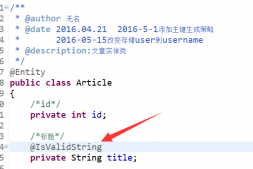Set里面的记录是无序的,如果想使用Set,然后又想里面的记录是有序的,就可以使用TreeSet,而不是HashSet,在使用TreeSet的时候,里面的元素必须是实现了Comparable接口的,TreeSet在进行排序的时候就是通过比较它们的Comparable接口的实现!
下面是HashSet的无序和TreeSet的有序的比较:
Test类:
|
1
2
3
4
5
6
7
8
9
10
11
12
13
14
15
16
17
18
19
20
21
22
23
24
25
26
27
28
29
30
31
32
33
34
35
36
37
38
39
40
41
42
43
44
45
46
47
48
49
50
51
|
import java.util.HashSet; import java.util.Iterator; import java.util.Set; import java.util.TreeSet; public class Test { public static void main(String args[]) { useHashSet(); useTreeSet(); } /** * Set默认是无序的,一般从Set里面拿出来的数据每次的顺序都会是不一样的,如果想里面的顺序一样 * 就使用TreeSet */ public static void useHashSet() { System.out.println("-----------------HashSet Start------------------"); Set<User> set = new HashSet<User>(); for (int i = 0; i < 10; i++) { User user = new User((i + 1), "uname" + (i + 1), "pswd" + (i + 1)); set.add(user); } Iterator<User> iter = set.iterator(); while (iter.hasNext()) System.out.println(iter.next()); System.out.println("------------------HashSet End----------------------"); } /** * TreeSet是有序的,TreeSet在给里面的元素排序是通过它们的Comparable接口的实现来比较的,所以, * 如果里面的对象没有实现Comparable接口,则TreeSet在运行时就会报错,所以如果想从Set里面拿出来的数据是 * 有序的就得使里面的对象实现Comparable接口,User2是实现了Comparable接口的,并对它们的id进行比较,id大 * 的就会排在后面 */ public static void useTreeSet() { System.out.println("-----------------TreeSet Start------------------"); Set<User2> set = new TreeSet<User2>(); for (int i = 0; i < 10; i++) { User2 user = new User2((i + 1), "uname" + (i + 1), "pswd" + (i + 1)); set.add(user); } Iterator<User2> iter = set.iterator(); while (iter.hasNext()) System.out.println(iter.next()); System.out.println("------------------TreeSet End----------------------"); } } |
User类:
|
1
2
3
4
5
6
7
8
9
10
11
12
13
14
15
16
17
18
19
20
21
22
23
24
25
26
27
28
29
30
31
32
33
34
35
36
37
38
39
40
41
42
43
44
45
46
47
48
49
50
51
52
53
54
55
56
57
58
59
60
61
62
63
64
65
66
67
68
|
public class User { private int id; private String username; private String password; public User() { } public User(int id, String username, String password) { this.id = id; this.username = username; this.password = password; } public int getId() { return id; } public void setId(int id) { this.id = id; } public String getUsername() { return username; } public void setUsername(String username) { this.username = username; } public String getPassword() { return password; } public void setPassword(String password) { this.password = password; } @Override public int hashCode() { final int prime = 31; int result = 1; result = prime * result + id; return result; } @Override public boolean equals(Object obj) { if (this == obj) return true; if (obj == null) return false; if (getClass() != obj.getClass()) return false; User other = (User) obj; if (id != other.id) return false; return true; } @Override public String toString() { return " id = " + id + ", \r\n username = " + username + ", \r\n password = " + password; } } |
User2类:
|
1
2
3
4
5
6
7
8
9
10
11
12
13
14
15
16
17
18
19
20
21
22
23
24
25
26
27
28
29
30
31
32
33
34
35
36
37
38
39
40
41
42
43
44
45
46
47
48
49
50
51
52
53
54
55
56
57
58
59
60
61
62
63
64
65
66
67
68
69
70
71
72
73
74
75
76
77
78
79
80
81
82
|
public class User2 implements Comparable<User2> { private int id; private String username; private String password; public User2() { } public User2(int id, String username, String password) { this.id = id; this.username = username; this.password = password; } public int getId() { return id; } public void setId(int id) { this.id = id; } public String getUsername() { return username; } public void setUsername(String username) { this.username = username; } public String getPassword() { return password; } public void setPassword(String password) { this.password = password; } @Override public int hashCode() { final int prime = 31; int result = 1; result = prime * result + id; return result; } @Override public boolean equals(Object obj) { if (this == obj) return true; if (obj == null) return false; if (getClass() != obj.getClass()) return false; User2 other = (User2) obj; if (id != other.id) return false; return true; } @Override public String toString() { return " id = " + id + ", \r\n username = " + username + ", \r\n password = " + password; } @Override public int compareTo(User2 user) { // TODO Auto-generated method stub //这里我的实现是按照id进行排序 if (user == null) return 1; if (id > user.getId()) return 1; else if (id == user.getId()) return 0; else return -1; } } |
运行结果:
|
1
2
3
4
5
6
7
8
9
10
11
12
13
14
15
16
17
18
19
20
21
22
23
24
25
26
27
28
29
30
31
32
33
34
35
36
37
38
39
40
41
42
43
44
45
46
47
48
49
50
51
52
53
54
55
56
57
58
59
60
61
62
63
64
|
-----------------HashSet Start------------------ id = 3, username = uname3, password = pswd3 id = 4, username = uname4, password = pswd4 id = 1, username = uname1, password = pswd1 id = 2, username = uname2, password = pswd2 id = 7, username = uname7, password = pswd7 id = 8, username = uname8, password = pswd8 id = 5, username = uname5, password = pswd5 id = 6, username = uname6, password = pswd6 id = 9, username = uname9, password = pswd9 id = 10, username = uname10, password = pswd10 ------------------HashSet End---------------------- -----------------TreeSet Start------------------ id = 1, username = uname1, password = pswd1 id = 2, username = uname2, password = pswd2 id = 3, username = uname3, password = pswd3 id = 4, username = uname4, password = pswd4 id = 5, username = uname5, password = pswd5 id = 6, username = uname6, password = pswd6 id = 7, username = uname7, password = pswd7 id = 8, username = uname8, password = pswd8 id = 9, username = uname9, password = pswd9 id = 10, username = uname10, password = pswd10 ------------------TreeSet End---------------------- |
感谢阅读,希望能帮助到大家,谢谢大家对本站的支持!
原文链接:http://blog.csdn.net/elim168/article/details/40586219















